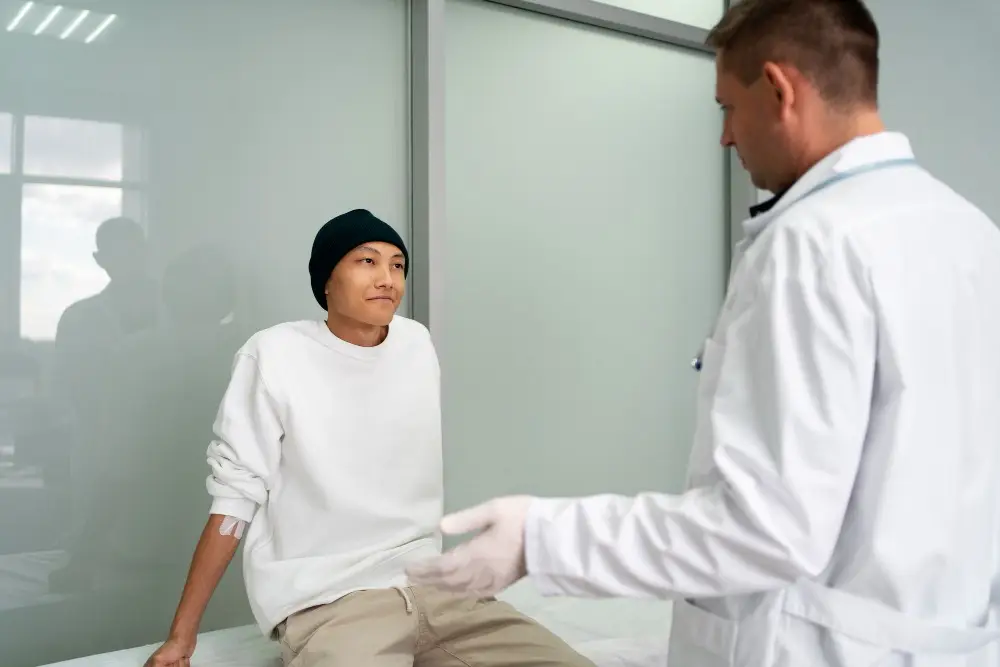Oncology nursing is a specialized field that requires both theoretical knowledge and hands-on experience. At GPAShark.com, we have built a reputation for providing Oncology Nursing Assignment Help Online to nursing students across the globe. Our experts—comprising MSN and DNP degree holders—are not only highly educated but also deeply experienced in real-world oncology practice. They work in various settings, including top nursing schools, acute care hospitals, hospice centers, and outreach clinics, ensuring that the help you receive from us is rooted in both knowledge and experience.
Table of Contents
Whether you’re grappling with a challenging oncology case study, writing a detailed essay, or completing nursing homework related to cancer patient care, GPAShark.com is here to guide you. We specialize in segmented nursing assignment help, focusing on specific areas like oncology and providing students with tailored solutions to their assignments. If you’re pursuing a career in oncology nursing, this guide will help you understand the importance of this field, the roles and responsibilities of oncology nurses, and the various challenges you may encounter.
Get your paper written by a professional writer
Unlimited revisions
AI & Plagiarism free
Join 200,000+ happy customers
Hire WriterWhat is Oncology Nursing?
Oncology nursing refers to the care of patients diagnosed with cancer or at risk of developing cancer. The role of oncology nurses is multifaceted and varies depending on the healthcare setting. Oncology nurses work in:
- Acute care hospitals
- Ambulatory care clinics
- Private oncologist offices
- Radiation therapy facilities
- Home healthcare agencies
- Community agencies
Oncology nurses interact with different oncologic disciplines, including:
- Surgical oncology: Nurses assist in caring for patients undergoing cancer-related surgeries.
- Radiation oncology: Nurses care for patients receiving radiation therapy.
- Gynecologic oncology: Nurses provide care to patients with cancers of the female reproductive system.
- Pediatric oncology: Nurses focus on children diagnosed with various types of cancer.
- Medical oncology: Nurses work with patients undergoing chemotherapy and other medical treatments.
Oncology nurses play a vital role in coordinating treatment and ensuring the overall well-being of cancer patients. This role often involves not only physical care but also providing emotional support to patients and their families during one of the most challenging experiences of their lives.
The Stages of Cancer
Cancer is categorized into different stages, each of which helps medical professionals determine the extent of cancer spread and plan the appropriate treatment. Nurses working in oncology must understand these stages to provide accurate assessments and interventions.
- Stage 0: Also known as carcinoma in situ, cancer cells are present but have not spread to nearby tissues. It is considered a non-invasive stage, and early intervention can often prevent the cancer from becoming more serious.
- Stage I: At this stage, cancer is localized to a small area. It is an early-stage cancer that has not spread to the lymph nodes or other tissues. The prognosis is often good if treated promptly.
- Stage II: Cancer has grown larger, but it is still localized. In some cases, it may have spread to nearby lymph nodes, but it has not reached distant parts of the body.
- Stage III: Cancer has spread more extensively to nearby tissues or lymph nodes. It is more advanced and may require aggressive treatment.
- Stage IV: This is the most advanced stage of cancer, where the cancer has spread (metastasized) to other parts of the body. Treatment at this stage focuses on managing symptoms and improving the patient’s quality of life.
Understanding the stages of cancer is crucial for oncology nurses, as the stage dictates the type of care and interventions required. Nurses must be able to interpret diagnostic tests and imaging studies to assess the severity of the disease and anticipate potential complications.
Role of Oncology Nurses
Oncology nurses are vital to the healthcare team, providing direct patient care, education, and emotional support to cancer patients and their families. Below are some of the primary roles and responsibilities of oncology nurses:
1. Patient Assessment and Communication
Oncology nurses are responsible for assessing the physical and emotional condition of their patients. This involves monitoring vital signs, evaluating symptoms, and understanding the patient’s medical history. Additionally, oncology nurses must communicate effectively with the patient, their family members, and the entire healthcare team. Clear communication is essential for developing comprehensive care plans tailored to each patient’s specific needs.
Since cancer treatment can be complex, oncology nurses serve as a bridge between the patient and the healthcare providers, helping patients understand their diagnosis, treatment options, and what to expect during the treatment process.
2. Administering Treatment
Oncology nurses play a crucial role in administering cancer treatments such as chemotherapy, radiation therapy, and immunotherapy. This requires a high level of precision and attention to detail, as these treatments are often associated with severe side effects. Nurses are also responsible for monitoring the patient’s response to treatment and making adjustments as needed.
In some cases, patients may experience adverse reactions to their treatment, such as nausea, vomiting, fatigue, or severe pain. Oncology nurses must be skilled in managing these symptoms and ensuring that patients receive the necessary interventions to alleviate discomfort.
3. Coordinating Care
One of the key roles of oncology nurses is coordinating the care of cancer patients, especially since cancer treatment often involves multiple healthcare professionals, including oncologists, surgeons, radiologists, and pharmacists. Oncology nurses ensure that all aspects of the patient’s care are well-coordinated and that the patient receives the necessary treatments and follow-up appointments.
They also help patients navigate the healthcare system, from scheduling appointments to arranging home healthcare services if needed. This coordination is essential to avoid treatment delays and ensure continuity of care.
4. Emotional Support and Counseling
A cancer diagnosis can be overwhelming, both for patients and their families. Oncology nurses are often the primary source of emotional support, providing a listening ear and offering guidance through the emotional ups and downs of cancer treatment. They are trained to help patients and their families cope with the psychological impact of the disease, providing reassurance, encouragement, and comfort throughout the treatment journey.
Many oncology nurses also work with cancer survivors, helping them navigate life after treatment and addressing long-term health concerns such as fatigue, anxiety, and the risk of cancer recurrence.
5. Public Education and Prevention
Oncology nurses also play a role in educating the public about cancer prevention. This includes informing people about risk-reduction strategies such as using sunscreen to prevent skin cancer, quitting smoking to reduce the risk of lung cancer, and encouraging regular screenings for cancers such as breast, cervical, and colorectal cancer.
Educating the public about cancer prevention can have a significant impact on reducing cancer incidence and promoting early detection, which can improve treatment outcomes.
Importance of Oncology Nursing
The role of oncology nurses is invaluable in the healthcare field, especially when it comes to managing and treating a life-threatening illness like cancer. Oncology nurses are at the forefront of patient care, ensuring that patients receive the appropriate treatment and support throughout their cancer journey.
One of the most critical responsibilities of oncology nurses is post-treatment care. After cancer treatment, many patients require long-term follow-up to manage lingering symptoms, prevent recurrence, and monitor for any new health complications. Oncology nurses help cancer survivors transition from treatment to recovery, addressing physical, emotional, and psychological needs.
Cancer survivors often experience complex health challenges after treatment, including fatigue, pain, depression, and anxiety. Some patients may also have comorbid conditions that further complicate their recovery. Oncology nurses are trained to monitor and manage these complications, ensuring that patients receive the comprehensive care they need to improve their quality of life.
Oncology nurses also play an important role in palliative care, which focuses on providing relief from the symptoms and stress of serious illness. For patients with advanced or terminal cancer, palliative care aims to improve the quality of life for both the patient and their family by addressing pain, anxiety, and other symptoms.
Oncology Nursing Assignment Help Topics
At GPAShark.com, we cover a wide range of topics within the field of oncology nursing to ensure that students receive comprehensive support. Our team of experts can help with assignments in areas such as:
- Care of patients receiving radiation therapy and chemotherapy: These treatments are often associated with side effects like fatigue, nausea, and pain, which oncology nurses are trained to manage.
- Lung cancer: Lung cancer is one of the most common cancers worldwide, and oncology nurses play a vital role in the care of patients with this diagnosis.
- Colorectal cancer: Oncology nurses provide care for patients undergoing surgery, chemotherapy, and radiation for colorectal cancer.
- Gastric cancer: Nursing care for gastric cancer patients includes managing symptoms like nausea, pain, and loss of appetite, as well as providing emotional support.
- Cervical cancer: Oncology nurses assist in the care of patients undergoing treatment for cervical cancer, including chemotherapy, radiation, and surgery.
- Breast cancer: Breast cancer is one of the most common cancers in women, and oncology nurses are key to providing care and support for these patients.
- Care of patients after bone marrow transplantation: Bone marrow transplants are used to treat certain types of cancer, and oncology nurses are responsible for managing the complex post-transplant care of these patients.
- Blood transfusion: Oncology nurses are involved in administering blood transfusions, which are often necessary for cancer patients with anemia or low blood counts.
If you need help with any of these oncology topics, GPAShark.com is here to provide expert assistance. Our nursing professionals will not only help you complete your assignments but also ensure that you gain a deeper understanding of the concepts involved.
Frequently Asked Questions (FAQ) – Oncology Nursing Assignment Help
What is Oncology Nursing and why is it important in the field of healthcare?
Oncology nursing involves the care of patients diagnosed with cancer. Oncology nurses play a crucial role in administering treatments like chemotherapy, radiation, and immunotherapy while providing emotional support to patients and their families. They help manage symptoms, provide education about the illness, and ensure patients receive quality care throughout their treatment and recovery phases. Their work is vital in improving cancer patient outcomes and enhancing their quality of life.
Can you help with specific oncology nursing care plans?
Yes, we specialize in creating tailored nursing care plans for oncology patients. This includes assessments, diagnoses, and detailed interventions focused on managing cancer treatment side effects, monitoring patient progress, and providing palliative care when necessary. Our experts can assist you with creating individualized care plans for patients undergoing chemotherapy, radiation therapy, surgery, or palliative care.
Do you provide evidence-based oncology nursing assignment help?
Absolutely. We help with assignments requiring evidence-based practices by incorporating the latest research and clinical guidelines from recognized sources such as the American Cancer Society, the Oncology Nursing Society, and other reputable journals. Our experts will guide you in applying evidence-based knowledge to your assignment, ensuring that your work is current, relevant, and academically sound.
Can you help with oncology nursing case studies?
Yes, we provide expert assistance with oncology nursing case studies. Our team will help you analyze complex patient scenarios, make appropriate nursing diagnoses, and develop effective care plans. We can guide you through patient assessments, treatment evaluations, and interventions based on real-life oncology cases to enhance your clinical decision-making skills.
How do you ensure my oncology nursing assignment is plagiarism-free?
We guarantee that every assignment is written from scratch and tailored to meet your specific requirements. We use plagiarism-detection software to ensure that the content is original. Additionally, our team follows strict academic integrity standards, citing all sources appropriately and providing well-researched, plagiarism-free content for every assignment.
Must Read:

